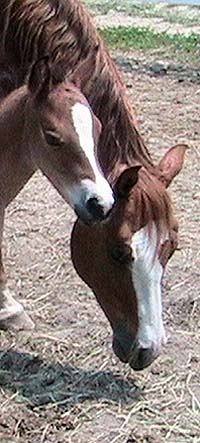|
Know the penalties
If you know what mistakes cost, you might be less likely to make them. Read the NRHA rulebook to find out what will cost you
half a point, what will cost two points, what earns you five points, and what will give you a zero.
Every maneuver is a new event
Every maneuver is scored separately, so if you have one bad maneuver, it doesn't mean that the rest of your pattern is going
to be a mess. Put whatever went wrong (or right, for that matter) behind you and focus on doing the best that you can in each
maneuver.
Stay smooth
Judges want to see a performance that is pleasing to watch and will mark for smoothness, so concentrate on flowing from one
maneuver to the next.
Avoid a pulling match
When you pick up on the reins, take, and then release. When you steer, do the same thing: steer, release, steer, release.
Think of every release as giving your horse a new mouth and encouraging softness and responsiveness.
Go for zero
Most people minus a maneuver because they over-try. Often, if you go for a zeo, you'll end up with a plus half. If you go
for a plus half, you'll end up with a minus half.
Always Hit the Middle
Think of the center of the pen as the "scanner" that records yhour purchases at the grocery store (for practice,
you might want to put a piece of paper on the ground in the center of the pen). Every time you go through the center, you
want to hit the "scanner" and turn in your score. It's important that your mental "scanner" be in the
exact center of the pen: you'll lose points if your circles don't hit center, as well.
Also, think of the "scanner" as your receipt for every maneuver: every time you complete a maneuver, you hand
it to the judge like an item in the checkout line at the grocery store: "here it is, add it up, mark it up." The
jduge give you a score (like a scanner marks up the cost of an item) then yo ugo on to the next maneuver, when you finish
it, you give it to the judge to mark, and then you put it behind you and go on to the next. The basic idea: each maneuver
is judged on its own and just because one is not good doesn't mean you should not try to get the next one right. But you need
to focus on the manuever, complete it, and go on to the next.
|
